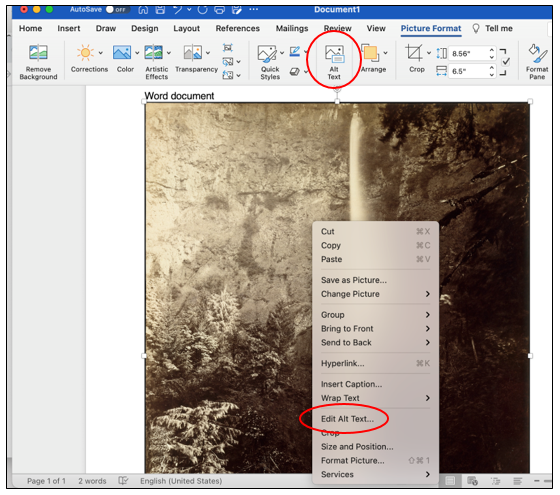Module 2, Lesson 3: Images (Mac)
If you use a PC, click this link to go to the Word for Windows (PC) module.
How are images used in a Word document?
Why are accessible images necessary?
How do I add alt text to images?
- Word for Mac via Office 365 (full program download)
- Word via Office 365 (web-based version)
- Word 2016 for Mac
How are images used in a Word document?
Besides text, many Word documents also contain images. The overall purpose of including images in a document should be to help the reader comprehend the purpose and/or meaning of the content they are reading. Some of the most common image types used within documents are:
- Descriptive or informative images
- Decorative images such as icons or logos
- Charts/graphs to represent information from a data table
Why are accessible images necessary?
Screen-reading software can only read text, not images or non-text graphics. Therefore, a reader who cannot see your document will only learn that there is an image there, not what the image is or what function it serves in the document.
Adding an alternative text description, also known as alt text, to the image alerts the screen-reading software that there is text to read aloud. When the screen reader passes over the visual element, it will read the alt text.
Alt text also makes web pages more accessible to anyone who is browsing on a weak internet connection or a small portable device like a smart phone. The alt text labels become visible while images are loading.
Alt text should not repeat what is already stated in captions or other document text. Think of it as a secret code that only screen reader users will be aware of. It will not appear to the naked eye, but rather is part of the document's code. Consider the following example:

Caption: In this painting the artist Emanuel Leutze used light and color to convey motion.
Notice that the caption does not really describe WHAT the image is. Add in alt text to give a description of what we see here. Maybe something like:
"George Washington looks forward with a determined gaze as his wary troops row their small craft across the Delaware River and into battle. The light of dawn, swirling water, and jagged icebergs add a dramatic effect."
How do I add alt text to images?
Word for Mac via Office 365 (full program download)
** Thanks to Hannah Tandeta, Accessibility Ambassador, for these instructions for Word 365.
- Insert an image into your Word document. Notice that the Picture Format tab appears.
- Click on the Alt Text command or hold down the Control key and click on the image.
- In the menu that appears, click Edit Alt Text. You will be prompted to add a 1-2 sentence description for the image.
- Close the Alt Text box when finished. There is no Save or OK button, but your alt text will be maintained.
Word via Office 365 (web-based version)
- Insert an image into your Word document. Notice that the Picture tab appears.
- Click on the Alt Text command.
- In the window that appears to the right, you will be prompted to enter a title and
description for your image. A title is usually not necessary unless appropriate,
such as for a piece of artwork or a graph. Close the Alt Text box when finished.
There is no Save or OK button, but your alt text will be maintained.
Word 2016 for Mac
- Insert an image into your Word document.
- Click the image to select it (look for handles to appear around the image's perimeter).
- Right-click the image to make the menu appear (to right-click on a Mac, hold down the Control key and then click the mouse).
- In the menu that appears, click Format Picture.

- Click the Layout and Properties button, then click Alt Text.

- Add a title and description for the image. The screen reader will read the title first, and then the description.
- When finished, close out the Format Picture menu. Your alt text will now be embedded in the image and will be read by a screen reader.
Here is a video to show how to add alt text to a document in Word 2016 for Mac.


